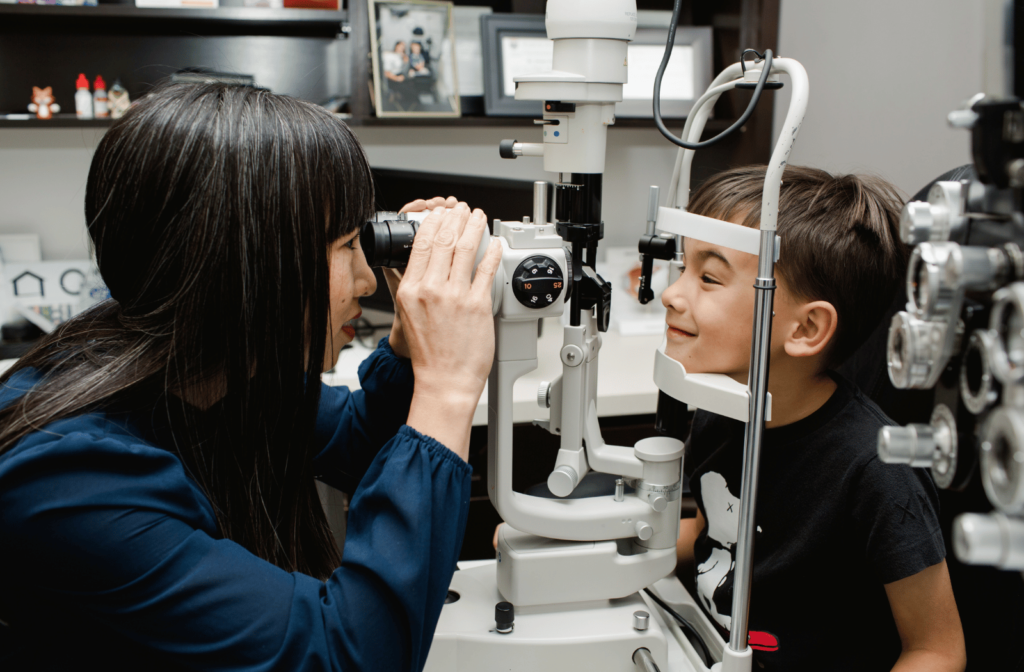Childhood is a time of many changes, and your child’s vision is no different. Eye exams are one of the best ways to follow along with these changes and take steps to protect kids’ eyes when necessary. Regular eye exams can help detect vision problems early on, which can go a long way in helping prevent complications down the road.
Henderson Vision Centre can examine your child’s visual acuity, eye health, muscle control, and more to help them focus in school and thrive through their growing years. If your child needs glasses, we can also help them find stylish frames and lenses that match their style and personality.
The Importance of Regular Eye Exams for Children
Eye problems can occur at any age, including childhood, when kids’ eyes are still developing. Identifying and treating vision conditions early helps kids avoid worsening vision and other adult eye problems.
Kid’s vision problems sometimes go undiagnosed because kids may not be aware of the symptoms or do not know how to express them. Regular eye exams help detect underlying vision problems your child may have, allowing early intervention and appropriate treatment if needed.
Additionally, undiagnosed vision problems can lead to physical, cognitive, and developmental issues in children. Poor sight can lead to problems with reading, writing, and other classroom-related tasks—and can also affect a child’s concentration and performance at school.
Some of the symptoms of undetected vision problems, such as headaches, eye strain, and fatigue, can also affect your child’s overall quality of life. A comprehensive eye exam is the first step to helping your child get full support for their eye health and vision needs.
When Should Kids See Their Optometrist?
Children should have their first eye exam before or near 6 months, with annual eye exams each year after that.
It’s especially important to schedule an eye exam before your child first starts school so they can get any help they might need for visual issues that can affect learning and other classroom experiences.
What to Expect During Your Child’s Eye Exam
Our eye exams use a combination of high-tech diagnostic tools and evidence-based techniques. Some vision conditions can be hard to notice, so we use a series of non-invasive tests to uncover them.
Preliminary Testing
The first phase of an eye exam often involves gathering your child’s medical and family history. We may ask specific questions about past medical conditions that can affect eye health. Additionally, we may inquire about any genetic history of eye conditions, like myopia and astigmatism. These questions help us fully understand your child’s needs.
After asking a few questions, we may perform a few initial tests with an autorefractor and digital retinal imaging equipment to examine your child’s unique eyes. These tests are non-invasive and help us get a complete picture of your child’s eye health.
Testing with an Optometrist
During your visit, we may start by assessing your child’s vision strength. In many cases, we’ll ask your child to read some letters or characters off a chart. For younger children, we may use special charts with shapes and colours.
If we suspect your child may need glasses, we may perform a refraction test to further determine what could be affecting their vision and how we can help your child see clearly with corrective lenses.
By using a mask-like device called a phoropter, we can cycle through a series of lenses. Your child can tell us which lens offers the clearest vision, and this helps us determine what corrective lenses may be ideal for your child’s needs.
We can also use a slit lamp to examine the internal structures as well as the surface of your child’s eyes. By taking a close look at your child’s eyes, we can spot eye disease during their early stages and get a start on managing and treating those conditions.
Other Tests
Depending on your child’s needs, we may perform other tests, such as:
Eye Muscle Testing
Not all children can articulate when there’s trouble with their vision, and this can become a huge problem. An eye muscle test can put some uncertainties to rest by helping check for signs of poor eye coordination or muscle weakness.
If we notice any concerning signs, we may suggest vision therapy to help your child practice and improve their visual skills and strengthen their vision.
Developmental Testing
Young kid’s eyes are still growing, and that can present some unique issues. An optometrist can conduct tests to look for developmental problems, such as strabismus, in which the eyes can become misaligned.
Strabismus usually first appears between birth and 21 months. If left untreated, the brain may eventually decide to ignore the image from one of your child’s eyes. This unused eye can become weaker, and the result could be a lazy eye, also known as amblyopia.
Identifying and treating developmental eye problems early can help kids avoid other eye issues that may develop as they continue to grow—and help them use their vision to its full potential.
Vision Care Made for Your Family
Eye care is critical for people of all ages. Regular eye exams can protect your child’s vision and help identify and treat any issues early on. We know that eye exams can be daunting for some children, but at Henderson Vision Centre, we strive to create an environment that’s welcoming while we help kids enjoy positive interactions with their eye doctor.
Book your appointment today, and see how we can help protect your family’s vision now and for the future.



